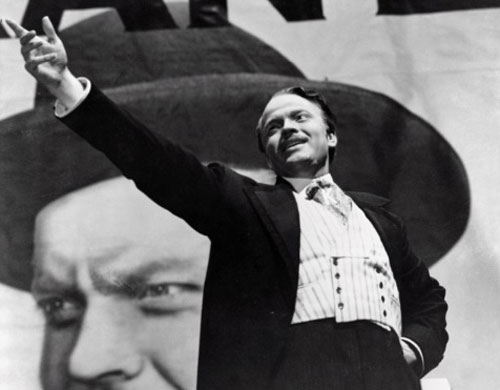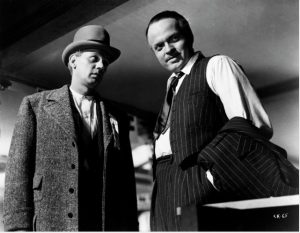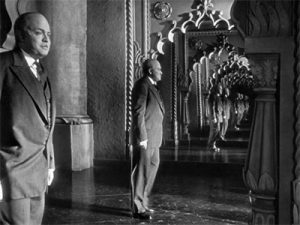
Citizen Kane has enthralled and frustrated critics, filmmakers and audiences ever since its premiere in May 1941, writes Lance Harris. The hard-to-please Pauline Kael — perhaps the most influential American film critic of the 20th century — called it a “a shallow work, a shallow masterpiece” yet admitted in the same 1971 essay that it is “perhaps the one American talking picture that seems as fresh now as the day it opened.”
For French intellectual Andre Bazin it was a film that could “never be too highly praised,” while Argentine fiction writer and essayist Jorge Luis Borges’s tone is one of grudging admiration when he describes it “a labyrinth without a centre.” It is a film of such enormous depth that it continues to surprise and perplex even after one has seen it a dozen times.
In the year of its 70th anniversary, Kane is more relevant than ever. Newspaper magnate Charles Foster Kane, sitting in his already-crumbling but unfinished Xanadu, is Colonel Gaddafi railing at the Libyan rebels from his exile or a doddering Rupert Murdoch stumbling over his words in front of the commission investigating the News of the World scandal.
The launch of an Ultimate Edition Blu-ray in the US on 13 September — a local release has yet to be announced — has put the film in the spotlight once again. Most of the special features, including a contentious PBS documentary called The Battle Over Citizen Kane and a made-for-TV film called RKO 281, are neither new nor inspiring, but critics say the visual treatment of the film itself is the one of the best available.

Boy genius Orson Welles was just 26 by the time Citizen Kane made its debut. Already famous as a radio personality, Welles was reeled into filmmaking by studio RKO with the lure of complete creative control over his projects. No Hollywood director before and few since enjoyed quite as much as freedom as Welles did in the making of his first film.
Welles settled on making a film loosely inspired by the life of media mogul William Randolph Hearst after he failed to bring two other movie ideas to fruition. In the making of the film, Welles surrounded himself with remarkable talents such as screenwriter Herman J Mankiewicz and cinematographer Greg Toland, leading some detractors like Kael to argue that the achievement is not all or even mostly his.
But there is little doubt that it was Welles’s purity of vision and clarity of purpose that fashioned Citizen Kane into the film that it became. Citizen Kane starts on the deathbed of Charles Foster Kane, played by Welles, with a close-up of the word “Rosebud” escaping through his lips as he dies. From there, we follow Kane’s rise and fall as a series of flashbacks narrated to a reporter as he interviews the people in Kane’s life to find out who or what he was referring to with his cryptic last word.
It is through a faux news report that we get an impression of what the large-than-life Kane represents in the public sphere, but the nature of his personal life proves more elusive. We get fragments from his colleagues, lover, guardian and butler, but these misshapen, subjective accounts do not fit together as a tidy whole.

Charles Foster Kane, the enigma at the centre of the film, is an amalgamation of a few people including Welles himself. But the largest inspiration for the character was the life and career of Hearst, the ruthless populist who owned a string of influential tabloid newspapers. His Castle Hearst mansion is model for Kane’s fortress of solitude, Xanadu: “The biggest and costliest monument a man has built to himself.”
If the biographical details aren’t clear enough, Kane’s famous line to a war correspondent, “You provide the prose poems. I’ll provide the war,” is an echo of Hearst’s “You furnish the pictures and I’ll furnish the war.” One theory put forward by Gore Vidal is that Rosebud was Hearst’s pet-name for his mistress’s clitoris.
Little wonder that Hearst did everything he could to suppress the film and ruin Welles, including a blanket ban on any mentions of Citizen Kane in his papers. Aptly enough, his efforts were in vain since Kane’s legacy has outlived Welles and Hearst alike. Seventy years later, where does one even begin to catalogue Kane’s contributions to filmmaking?
Perhaps most famously, Kane’s deep-focus photography that kept everything in the frame in focus went on to inspire how countless other directors and cinematographers would shoot their films in the future. The fragmented, non-linear narrative approach — Borges says we don’t get to know Kane except as “a simulacrum, a chaos of appearances” — would be as influential.
Then, there’s the makeup — apparently it took as much effort to transform the chubby Welles into the dapper young Kane as to make him as convincing as the man in older life. Acting from Welles, Joseph Cotten and others in the film, the sound editing, the use of music, the special effects — nearly every element of Kane brought something new to the cinema.
Unlike many other films that broke new ground in terms of style and technique, Citizen Kane has aged remarkably well. That is partly because its innovations have been absorbed into filmmaking over the years — some critics even see the performances in the film foreshadowing method acting.
But it is also because Citizen Kane has such unity of meaning and method that the techniques Welles uses to bring his themes to life become completely invisible. Unless you’re studying the film frame by frame looking for the technical wizardry, you’ll be sucked into Kane’s mad but futile pursuit of power rather than contemplating Toland’s clever use of low-angle camera shots.
Citizen Kane is also still a surprisingly entertaining film, with some sly wit (when asked how he found business conditions in Europe, Kane answers, “with great difficulty”) and poignant drama to leaven its weighty themes. Crowd-pleasing directors such as Steven Spielberg owe it as much as any art-house virtuoso.
Today, you’ll see Citizen Kane’s influence in the strangest places, from parodies in The Simpsons through to the dialogue The White Stripes cribbed from the film for the lyrics of The Union Forever. The totems that Inception’s dream voyagers use to anchor themselves to reality recall Kane’s Rosebud and the film’s hall of mirrors sequence is a direct hat-tip to Citizen Kane.
A 1967 essay from French New Wave auteur Francois Truffaut offers this eloquent summary of its enduring appeal: “We loved this film absolutely because it was so complete — psychological, social, poetic, dramatic, comic, grotesque. Kane both demonstrates and mocks the will to power.
“It is a hymn to youth and a meditation on age, a study of the vanity of all human ambition and a poem about deterioration, and underneath it all a reflection on the solitude of exceptional beings, geniuses or monsters, monstrous geniuses.”
Welles himself turned out to be a monstrous genius, albeit one with more capacity for self reflection than the fictional Kane. He was conceited enough to think that he would emerge from his fight with Hearst unscathed, but the bruising battle with the billionaire did untold damage to his film career.
Though Welles made many more masterpieces — among them The Trial, The Lady from Shanghai, The Magnificent Ambersons and A Touch of Evil — he never found commercial success and was always a bit of a Hollywood outsider. By the end of his life, he was reduced to flogging photocopiers. — Lance Harris, TechCentral
- Subscribe to our free daily newsletter
- Follow us on Twitter or on Facebook

